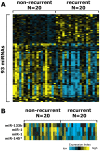miR-1 and miR-133b are differentially expressed in patients with recurrent prostate cancer
- PMID: 24967583
- PMCID: PMC4072786
- DOI: 10.1371/journal.pone.0098675
miR-1 and miR-133b are differentially expressed in patients with recurrent prostate cancer
Abstract
Prostate cancer (PCa) is currently the most frequently diagnosed malignancy in the western countries. It is more prevalent in older men with 75% of the incident cases above 65 years old. After radical prostatectomy, approximately 30% of men develop clinical recurrence with elevated serum prostate-specific antigen levels. Therefore, it is important to unravel the molecular mechanisms underlying PCa progression to develop novel diagnostic/therapeutic approaches. In this study, it is aimed to compare the microRNA (miRNA) profile of recurrent and non-recurrent prostate tumor tissues to explore the possible involvement of miRNAs in PCa progression. Total RNA from 41 recurrent and 41 non-recurrent PCa tissue samples were used to investigate the miRNA signature in PCa specimens. First of all, 20 recurrent and 20 non-recurrent PCa samples were profiled using miRNA microarray chips. Of the differentially expressed miRNAs, miR-1, miR-133b and miR-145* were selected for further validation with qRT-PCR in a different set of 21 recurrent and 21 non-recurrent PCa samples. Data were statistically analyzed using two-sided Student's t-test, Pearson Correlation test, Receiver operating characteristic analysis. Our results demonstrated that miR-1 and mir-133b have been significantly downregulated in recurrent PCa specimens in comparison to non-recurrent PCa samples and have sufficient power to distinguish recurrent specimens from non-recurrent ones on their own. Here, we report that the relative expression of miR-1 and mir-133b have been significantly reduced in recurrent PCa specimens in comparison to non-recurrent PCa samples, which can serve as novel biomarkers for prediction of PCa progression.
Conflict of interest statement
Figures




References
-
- Fendler A, Jung M, Stephan C, Honey RJ, Stewart RJ, et al. (2011) miRNAs can predict prostate cancer biochemical relapse and are involved in tumor progression. Int J Oncol 39: 1183–1192. - PubMed
-
- Brookman-Amissah N, Nariculam J, Freeman A, Willamson M, Kirby RS, et al. (2007) Allelic imbalance at 13q14.2 approximately q14.3 in localized prostate cancer is associated with early biochemical relapse. Cancer Genet Cytogenet 179: 118–126. - PubMed
-
- Barron N, Keenan J, Gammell P, Martinez VG, Freeman A, et al. (2012) Biochemical relapse following radical prostatectomy and miR-200a levels in prostate cancer. Prostate 72: 1193–1199. - PubMed
Publication types
MeSH terms
Substances
Grants and funding
LinkOut - more resources
Full Text Sources
Other Literature Sources
Medical
Molecular Biology Databases

